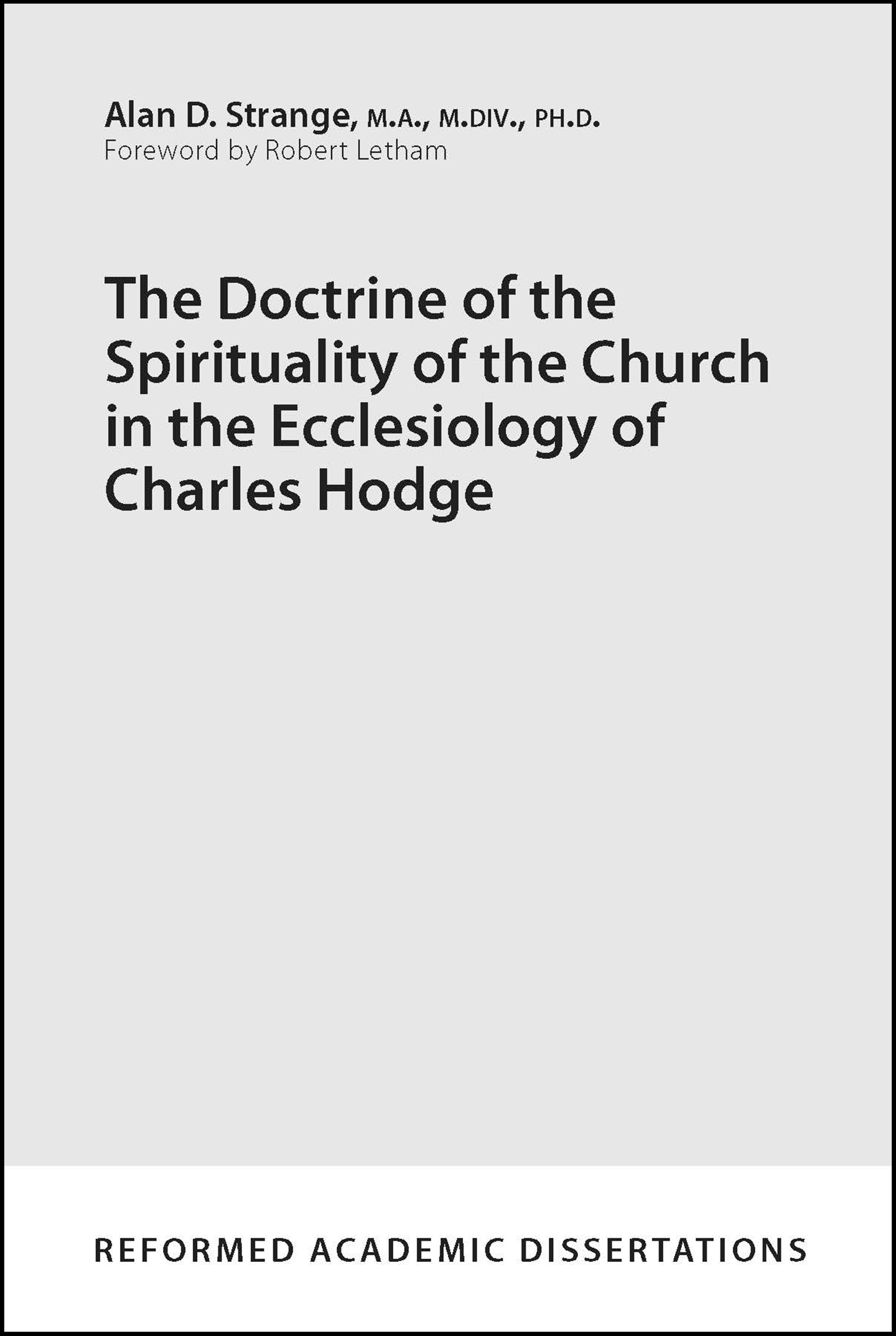This week’s author interview is with Alan Strange. He is the author of the Reformed Academic Dissertation: The Doctrine of the Spirituality of the Church in the Ecclesiology of Charles Hodge.
- Question #1—Tell us a little bit about yourself: where you’re from, family, job, personal interests, unique hobbies, what you do in your spare time, etc.
I am originally from Hattiesburg, MS. My Dad worked for an oil and gas company so we moved around, living in several places in MS, TX, and LA. I went to undergraduate college in LA and graduate school in VA, followed by WTS in PA (still a Baptist when I went there). I pastored an OPC in Glassboro, NJ for almost ten years. I married my wife Kathy at the church I interned in and we have five children, two of whom are married. I’ve been at Mid-America Reformed Seminary since 1999 where I am Professor of Church History. I love reading, walking, spending time with my family, dining with friends, and, as a retired trombonist, regularly attending the Chicago Symphony Orchestra and the Lyric Opera of Chicago.
- Question #2—I can see from your first answer that you are a passionate music lover. Tell me more about what music you love.
As noted above I love orchestral and operatic music (across the board): Bruckner and Mahler (in addition to the great standard composers) would be favorites (Mahler’s 2nd, the Resurrection Symphony, especially) as would the great bel canto (favorites: Norma and Lucia) and verismo (favorites: Tosca and Turandot) composers, as well as Verdi (Rigoletto, Aida) Wagner (Lohengrin, Ring). I’ve been privileged to see many of the great conductors, orchestras, singers and opera companies of our time, favorites being Bernstein conducting Beethoven with Boston and Pavarotti in the title role of Il Trovatore at the Met. I could go on at length (I’ve written an article or two on music) but that should give some idea.
- Question #3—Have you always enjoyed writing?
Let me answer as did Hemingway: I like to have written!
- Question #4—What inspired you to write this book, about this topic?
This was my dissertation, of course. I explored a number of topics and thought that this one was particularly needed at this point in American church history. The spirituality of the church has been historically abused to silence the church’s prophetic voice, and yet the doctrine is vital given that its mission is a spiritual one. I discovered that Hodge well expressed this balance. To be sure, he had his own problems, but was generally clear and helpful in his articulation of the spirituality of the church. It also brought together my theological and polity interests: the church’s message is spiritual and so is its method (the gospel carried out in a ministerial and declarative fashion, another expression of the spiritualty of the church).
- Question #5—What book are you reading now?
I’ve been reading and re-reading the great Russian authors (just read Karamazov), now finishing Anna Karenina, a remarkable book that must seem inaccessible to many in the current moral climate.
- Question #6—Other than the Bible, do you have a favorite book?
In my field, I enjoy and admire George Marsden as a historian. His erudition and equity are particularly on display in his magisterial biography of Jonathan Edwards. Most of us historians would love to be able to write a book like that on such a subject.
- Question #7—Do you have a favorite author? Who is it and why?
I do love the Southern writers (and the Russians, as I noted above; they have a great deal in common) for their unparalleled insight into the human condition. William Faulkner is a favorite in this regard and one of my favorite quotes is from him: “The past is never dead. It’s not even past.”
- Question #8—Do you have a favorite movie? What is it and why?
My wife and I love documentaries and foreign films. In the latter category, “Babette’s Feast” is a favorite.
- Question #9—Favorite sport to watch? Favorite sport’s team?
I love baseball and the Cubs. Right now, after beating Washington to make it to the NLCS, they are taking a beating from the Dodgers. But we’ve had a good time in the Theo Epstein era, especially last year in winning the World Series. Why? There’s no game like it. No clock. No back and forth on a rectangle. Just read George Will, who well captures the brilliance and beauty of the game.
- Question #10—Favorite food?
Well I love Italian food (pasta particularly) and seafood. It’s time again to make my seafood gumbo with shrimp, crab, oysters, andouille, etc.
- Question #11—The Lord of the Rings or The Chronicles of Narnia? Why?
My family would be divided on this question; I prefer Narnia. Fantasy is not a preferred genre for me: I like my history and my fiction more realistic.
- Question #12—What famous person (living or dead) would you like to meet and why?
So many. Augustine, Anselm, Luther, but especially as an American church historian, Edwards, Davies, and Hodge. Machen, too. These were all great men who contributed significantly to the church in their times.
- Question #13—If you have a favorite book of the Bible, what is it and why?
I like especially, as so many do, the Gospel of John. The perspective that it gives on our Savior is thrilling, from the matchless prologue (the greatest single thing ever written) to the restoration of Peter. There’s nothing like it in the world! Jesus is God and man in one person and this book proclaims that non pareil.
How can readers discover more about you and your work?
- Website: http://www.midamerica.edu/faculty/alan-strange
- Facebook Page: https://www.facebook.com/MidAmericaReformedSeminary/



Comments